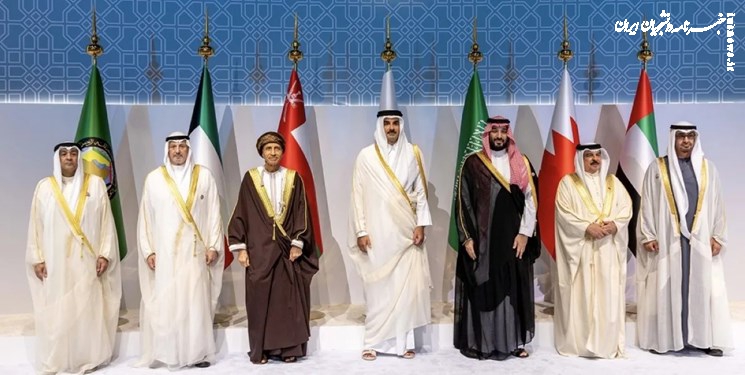to report «iusnews»; Iranian Foreign Ministry Spokesman Nasser Kana’ani slammed the Persian Gulf Cooperation Council's (PGCC) summit’s stance on Tehran, and once again cautioned that the presence of trans-regional powers poses danger to all countries in West Asia.
Following their 44th session in Qatar’s Doha on Tuesday, the leaders of the Persian Gulf Cooperation Council (PGCC) repeated baseless claims against Iran regarding the Arash gas field, Iran’s nuclear program, defense capabilities, and the three Iranian islands in the Persian Gulf.
In response to certain clauses of the final statement of the summit, Kana’ani said the three islands of Abu Musa, the Greater Tunb and the Lesser Tunb are integral and eternal parts of Iran’s soil.
The spokesperson added Tehran regards any claim on the trio islands as “interference in its domestic territory” as well as its “territorial integrity and sovereignty”, and strongly condemns it.
International documents clearly show that the three islands of the Greater Tunb, the Lesser Tunb and Abu Musa which were historically owned by Iran, temporarily fell to British control in 1903. The islands were returned to Iran based on an agreement in 1971 before the UAE was born.
Iran has repeatedly declared that its ownership of the three islands is unquestionable, and on numerous occasions stoutly rejected claims leveled by the Persian Gulf countries to the islands.
Under international law, no state can defy any agreement, which came into being before its establishment.
Kana’ani also stressed that Iran’s missile capabilities are within the framework of “a transparent military doctrine” and based on “deterrence and protection of national security”.
Iranian officials have repeatedly stressed that the country will not hesitate to boost its military capabilities, including its missile and drone power, which are entirely meant for defense, and that Iran’s defense capabilities will never be subject to negotiation.
“Real danger to regional stability is the military presence of trans-regional players as the root cause of insecurity and threats to Islamic states as well as regional peace,” the foreign ministry spokesman underlined.
The top diplomat also underscored Iran’s role in ensuring stability and in the real fight against terrorism as well as in the promotion and enhancement of maritime security.
Iranian officials have repeatedly underlined the necessity for the settlement of the crises and problems in the region through collective interaction among the regional states, and underscored that the presence of foreigners is harmful. They have stated that foreign troops should end their illegal presence and withdraw their forces from the region with no delay.
Tehran urges the neighboring countries to be extremely vigilant about any US-Israeli plan that clearly aims to disturb the stability and order of the region.
Kana’ani also said Iran has always complied with international regulations and its international commitments within the framework of rights and duties, and will go on with its constructive interactions with the International Atomic Energy Agency (IAEA) based on the comprehensive Safeguards Agreement.
Iranian officials say Tehran is not in pursuit of developing a military nuclear capability to defend itself, reiterating that nuclear weapons have no room in Iran's military doctrine.
Supreme Leader of the Islamic Revolution Ayatollah Seyed Ali Khamenei has even issued a fatwa (religious decree) declaring that the acquisition, development, and use of nuclear weapons violate Islamic principles and are therefore forbidden.
Tehran has repeatedly rejected all accusations levelled by the West over the existence of undeclared nuclear activities or material in Iran, describing the allegations by the US and its European allies as a propaganda campaign against the country's peaceful nuclear program.
Iran proved the peaceful nature of its nuclear program to the world by signing the 2015 nuclear agreement with six world powers. However, Washington’s exit in May 2018 and its subsequent re-imposition of sanctions against Tehran left the future of the accord in limbo.
Iran has always had full cooperation with the IAEA and allowed it to visit the country’s nuclear sites, but calls the nuclear agency's approach unconstructive and destructive. Tehran has asked the watchdog to avoid politicizing the issue and focus on technical aspects in line with the organization’s mandate.
Iranian officials have repeatedly called on IAEA Director General Rafael Grossi to stop Israeli-influenced attitude, and emphasized that Tehran would never surrender to the political behavior of the UN nuclear watchdog that is affected by the Zionist pressures.
In an interview with Al-Jazeera news television network in late September, Head of the Atomic Energy Organization of Iran (AEOI) Mohammad Eslami stated that his country’s nuclear activities are to be inspected 10 times more than other states while the size of Tehran’s nuclear facilities is about 2% of the world’s nuclear sites.
The official stressed that it’s not reasonable for his country to be checked ten times more than other nations.
Tehran has on many occasions voiced its readiness to resolve differences with the UN nuclear body within a framework of constructive and mutual interaction and technical collaboration.
Touching upon Iran’s principled policy of enhancing ties with neighboring countries in keeping with the good-neighbor policy, mutual respect and non-interference in one another’s internal affairs, Kana’ani stressed Tehran’s determination to have a stable, secure and thriving region within the framework of cooperation with neighboring countries and rejection of foreign meddling.



